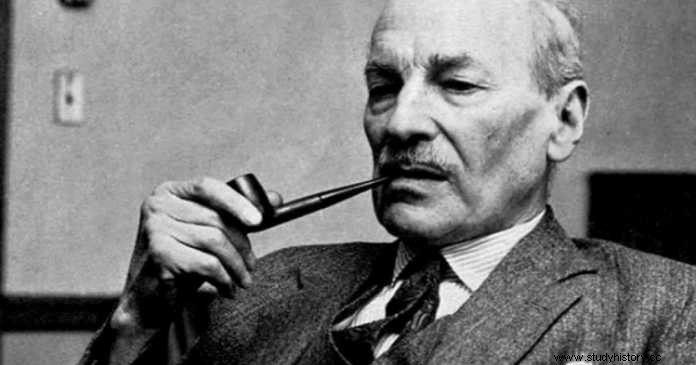
Announcement of Prime Minister Attlee
Seeing the progress being made by the Muslim League of the interim government in India, the British made up their mind to get rid of India by any means. Therefore, British Prime Minister Attlee suddenly announced in the British-Parliament on 20 February 1947 that- 'The current state of uncertainty is fraught with danger and cannot be continued indefinitely. Her Majesty's Government would like to make it clear that it is determined to take the necessary steps to complete the transfer of power into responsible Indian hands before 20 June 1948. ……….. If the fully representative Constituent Assembly could not prepare a constitution by June 1948, then His Majesty's government would consider in whose hands the central authority in British-India should be handed over. Either in the hands of the Central Government or in some areas in the hands of the Provincial Governments.'
At the end of this resolution, it was announced to make Lord Mountbatten the new Viceroy of India in place of Lord Wavell so that he could transfer the responsibility of the governance of India to Indian hands in such a way that would best ensure the future happiness and prosperity of India. can do. Every Indian could easily understand the heat of the words used in this declaration. The intention of the declaration was clear - the transfer of power would take place under any circumstances, whosoever had to be done, whatever had to be done. Whether India remains one or its fragments.
That is why the transfer of power could not be said to be a generous announcement made by the emperor, but through this it was challenged in hidden words that this time the Indian element who tried to pressure the British government to agree to its terms, Will definitely be in deficit and the transfer of power will be given to those who will obey the British government. Thus this time the responsibility of transfer of power was left less on the British and more on the Indians to take independence peacefully……… otherwise the British would leave India unclaimed.
Congress understood that now the time to fight the British is over, now they have to save their country from the hands of Muslim League, save maximum part of the country by causing least damage. The Muslim League also understood that now they do not need to worry on the side of the British, they have to waste their punches only on the Congress and get maximum Pakistan by making India's native-kings and Dalit leaders on their side.
A Pakistan without Nehru, Gandhi and Patel, no Congress, no pundits like Janeudhari Malviya, only Jinnah, Liaquat Ali, Chaudhary Mohammad Ali and followers like Suhrawardi who blindly follow them. P>
Therefore, with the announcement of Prime Minister Attlee, there was panic in India. No one expected that England would so easily give up the most precious diamond in her Queen's crown. This could not be attributed to any one element. Neither the freedom struggle going on in India, nor the Congress, nor Gandhiji…… as claimed later. Rather, it was the combined result of many events and cycles, some of which were as follows-
(1) International powers like America, Russia, France, China were pressurizing England to make India independent.
(2) Due to the ongoing communist movements in India, such a series of strikes were started by the workers, which was not in the control of the British government to deal with.
(3) The condition of England on the front of the Second World War had become so bad that it was no longer able to control a big country like India.
(4) Due to the sudden demise of Netaji Subhas Chandra Bose, the distrust of the British in the minds of Indians had reached its peak. Most Indians believed that Subhash Babu was murdered and the British were involved in this act.
(5) Muslim League had proved by organizing Direct Action Day that it is not in the hands of anyone to stop its goons, neither the British government nor the Congress.
(6) The Congress was now more anxious to get rid of the Muslim League than the British.
(7) The British's self-confidence was completely destroyed by the killings of British officers in the armed rebellions of the Indian forces.
Britain certainly did not have the power to deal with all these together. Now the situation had reached the stage from which the British had to get rid of India so that the British officers and their families living in India could safely leave India and reach England. For this, if they had to cut India into a thousand pieces, then the British would not hesitate to do so.
